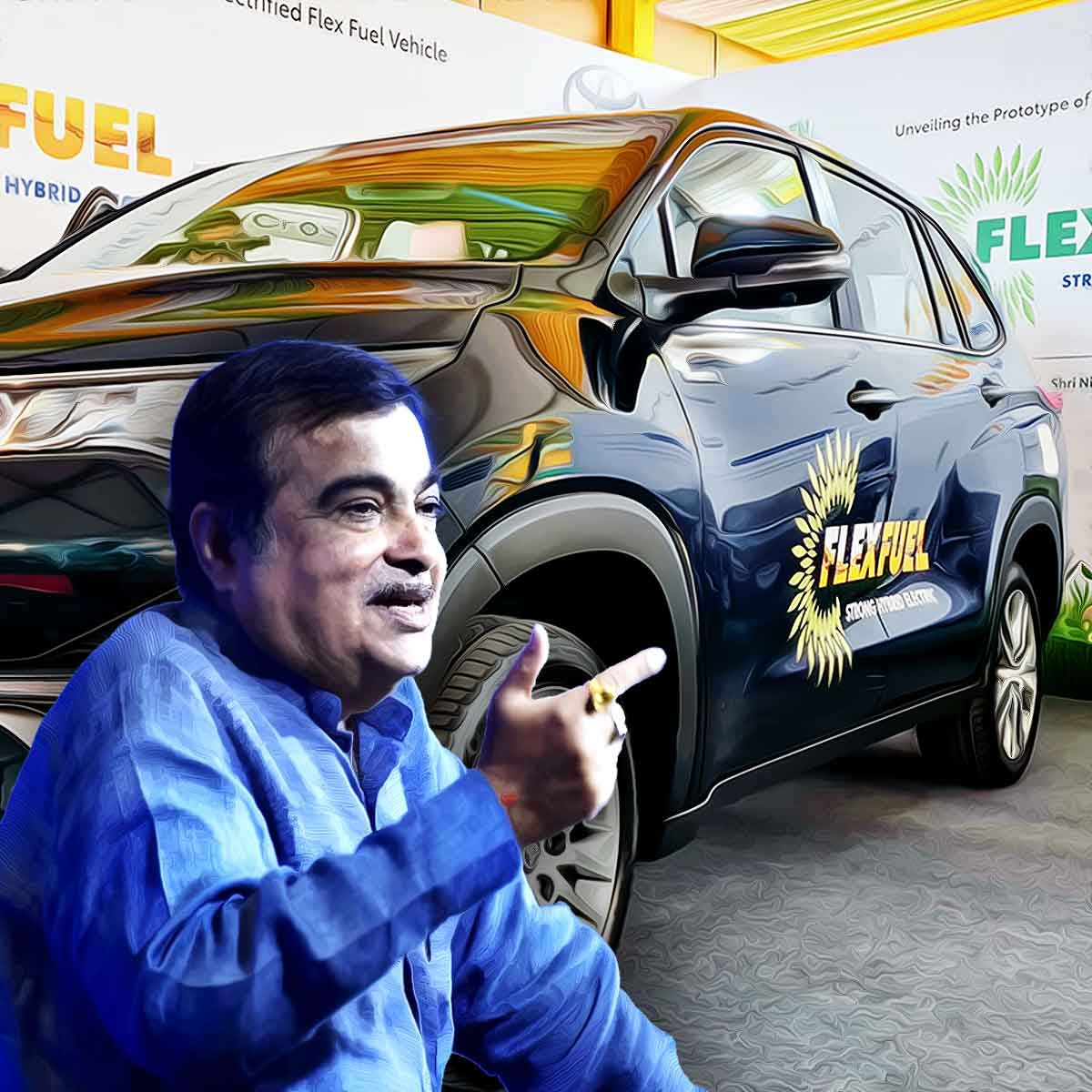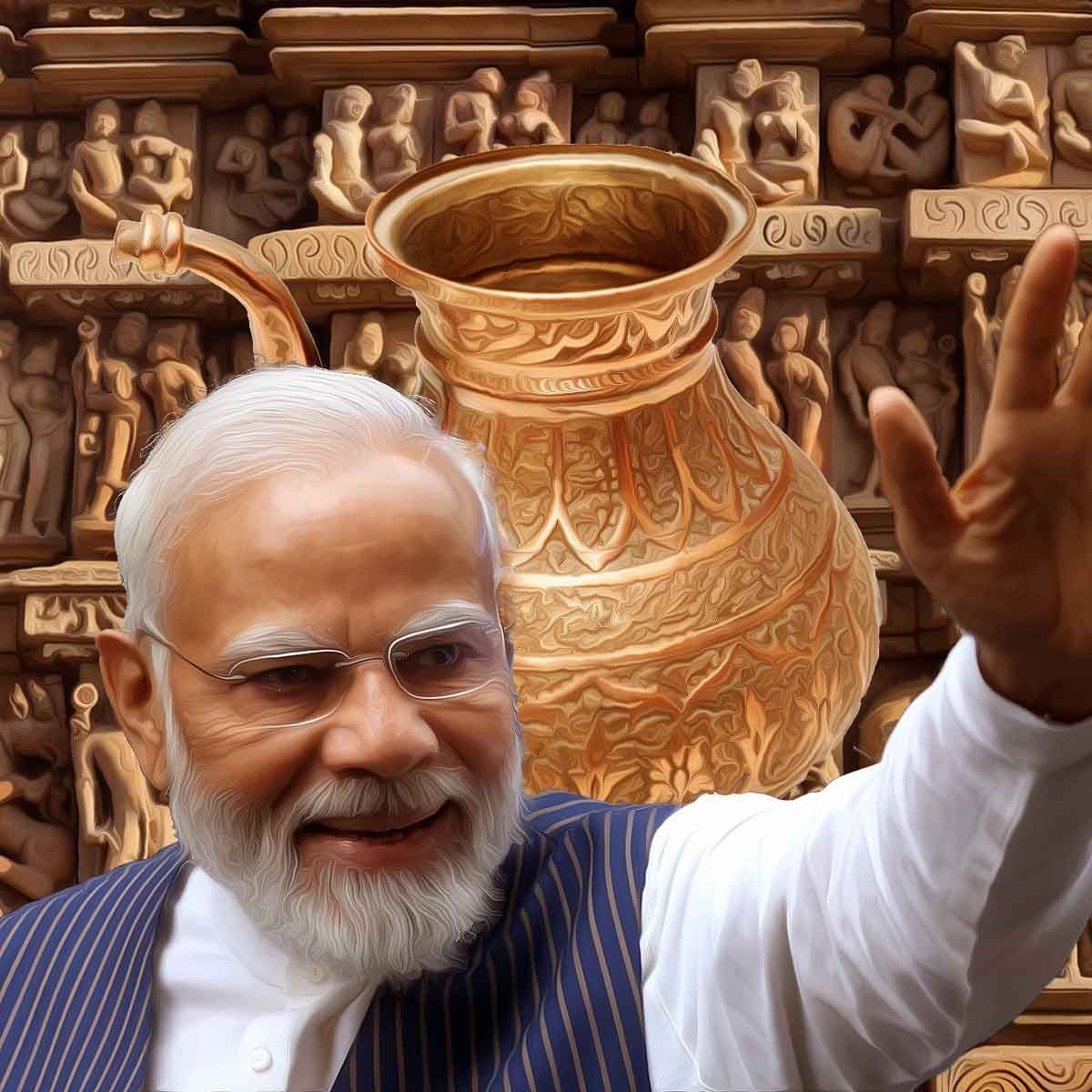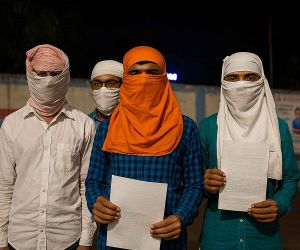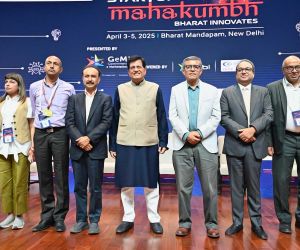MORE COVERAGE
Twitter Coverage
Satyaagrah
Written on
Satyaagrah
Written on
Satyaagrah
Written on
Satyaagrah
Written on
Satyaagrah
Written on
JOIN SATYAAGRAH SOCIAL MEDIA
In a monumental stride, India unveils the world's first BS-VI ethanol car, blending technology with agriculture and championing a vision for a sustainable, greener future while bolstering its economy & reinforcing its stand on environmental responsibility

In what can be hailed as a landmark moment for sustainable energy solutions, Union Minister of Road Transport and Highways, Nitin Gadkari, made a sensational revelation on Tuesday. Proudly presenting to the nation and the world, he unveiled the prototype of a car that's a testament to human ingenuity and technological advancement, developed in partnership with Toyota Kirloskar Motor.
Dubbed as the Toyota Innova HyCross, this marvel isn't just any other car. It stands out by running solely on 100% ethanol (E100), marking a significant stride towards green and sustainable transportation. Breaking down its operational capabilities, the vehicle can efficiently cover 40% of its journey utilizing ethanol. The other 60%? It relies on electric power, ensuring the petrol engine remains completely turned off, an embodiment of a reduced carbon footprint.
Gadkari, during this historic launch, eloquently remarked, “Increased demand for ethanol for blending with petrol and diesel will revolutionize India's agricultural landscape, turning our hardworking farmers into ‘urja daata’ (energy providers).” This vision not only embraces environmental consciousness but also sees a brighter future for India's agricultural sector, embedding them firmly at the forefront of energy production.
But what makes this unveiling even more noteworthy? While it's true that flex-fuel vehicles have found their way into the international market previously, and even Toyota has made strides by launching a flex-fuel variant of its renowned Corolla just last year, the Toyota Innova HyCross stands apart. It has the distinctive honour of being the first flex-fuel vehicle that aligns perfectly with India's stringent BS-VI emission norms, as stated by the company.
India's journey into sustainable energy and transportation is not just about meeting global standards. It's about setting them. And with this step, the nation once again showcases its commitment to a greener, more sustainable future, not only for its citizens but for the world. The world watches as India drives into a cleaner, brighter tomorrow.
|
Revolutionizing Agriculture with the Ethanol Wave: Gadkari's Vision for a Prosperous India
While India basks in the pride of significant contributions from the manufacturing and services sectors, the heart of its economy - agriculture, paints a different picture. Despite being the primary source of livelihood for a whopping 65% of India's populace, agriculture and its allied industries contribute a mere 12% to the nation's Gross Domestic Product (GDP). This stark disparity was highlighted by Nitin Gadkari, the visionary Union Minister of Road Transport and Highways.
However, in this perceived shortcoming, Gadkari sees a silver lining. With the world shifting its gaze towards sustainable energy solutions, the ethanol industry emerges as the knight in shining armor for India's agrarian landscape. Gadkari passionately emphasized, “The burgeoning demand for ethanol will not only reshape our agricultural economy but elevate our farmers from being just ‘anna daata’ (food providers) to a pivotal role as ‘urja daata’ (energy providers).”
This isn’t just a fleeting dream but a concrete vision. The minister confidently expressed that as the demand for ethanol spirals, agriculture's share in GDP won’t remain static. It’s bound to grow. Gadkari, with his characteristic enthusiasm, remarked, “Imagine the day our ethanol economy touches the Rs 2 trillion mark. I am confident that our agricultural growth rate, which presently stands at 12%, will leap forward to an impressive 20%.”
The optimism doesn't end there. India has been aggressively testing alternative fuels across various platforms – be it vehicles, generator sets, or even aircraft. The results? Overwhelmingly successful, as accentuated by the minister.
|
Moreover, Gadkari proudly shared a moment of international recognition. Our neighbouring nation, Bangladesh, recognizing India's strides in the ethanol-blended fuel domain, has extended a request for a supply of this sustainable petrol blend.
This isn't just a story of technological advancements or sustainable solutions. This is India's tale of resilience, innovation, and a pledge to its farmers and the environment. With leaders like Gadkari at the helm, the nation's path to prosperity is illuminated brighter than ever.
The air around us was thick with anticipation, and rightly so. India stood at the cusp of an agricultural and technological revolution. Gadkari, in his quintessential fervour, declared, “Today's achievement is not just a mere advancement in automotive technology. It’s a resounding testament to the spirit of Indian innovation and a significant leap for our farmers."
Echoing the same sentiment, he extended his heartfelt gratitude to Toyota Kirloskar’s management. “The inception of this eco-friendly technology isn't just a stride towards curbing pollution. It's a beacon of hope for the thousands who will find employment in the agriculture sector because of it." The minister's vision is crystal clear. He envisages a future where the streets of India are dominated by vehicles running purely on ethanol, be it motorcycles, e-rickshaws, autorickshaws, or cars.
However, the aspirations don’t stop there. Union Minister of Petroleum and Natural Gas, Hardeep Singh Puri, delved into the historical trajectory of India's ethanol-blended fuel efforts. "Back in 2014, our ethanol blending stood at a mere 1.53%. Fast forward to March 2023, and we’ve witnessed an over eightfold increase, registering an impressive 11.5% blending rate." This isn't just a statistic. This impressive augmentation symbolizes not only substantial import bill savings but a significant reduction in carbon emissions, pushing India closer to its sustainability goals.
E20, a term often resonated in eco-conscious circles, refers to petrol enriched with 20% ethanol. Puri expressed immense satisfaction at the progress India has made in this realm. "Our initial plan targeted E20 blending by 2030. But, with relentless dedication from all stakeholders, we’re on track to achieve this remarkable feat by 2025," he proudly claimed.
|
As the nation speeds towards a future dominated by ethanol, it isn’t just about reducing carbon footprints or import bills. It's a narrative of national pride, innovation, and a commitment to a brighter, greener, and more prosperous future for all.
The ethos of India's march towards a sustainable future resounded through the halls as further announcements were made. "Our mission is clear and our roadmap even clearer," the atmosphere seemed to suggest. E20 fuel, a beacon of hope for India's green aspirations, is now available in over 3,300 fuel stations across the vast expanse of our nation. And by April 2025, no corner of India will be untouched by its presence.
The economic implications of this transition are monumental. "With the nationwide implementation of E20 by April 2025, we’re looking at an expected annual cutback of a staggering Rs 35,000 crore on our import bill. This equates to a remarkable displacement of 63 million barrels of gasoline imports for the fiscal year 2024–25," the announcement reverberated with a sense of national pride.
But this isn't just a national endeavour. It's a global partnership. And standing shoulder to shoulder with India in this green march is Toyota Kirloskar Motor. Masakazu Yoshimura, the luminary at its helm, couldn't contain his elation. "This is not just an achievement; it's a testimony," he began, "A testimony to our unwavering commitment to fostering a carbon-neutral mobility society, perfectly aligned with the noble initiatives of the Government of India."
Toyota Kirloskar's ethos is clear. They’re not mere spectators in this grand transformation. They're active contributors, continuously gauging and implementing cleaner technologies, meticulously tailored to the local ecosystem. This holistic approach, considering the multifaceted elements of energy mix, infrastructure, and consumer acceptance, aims to herald a significant reduction in fossil fuel consumption and the associated carbon footprints.
"In our relentless pursuit of a greener, cleaner India, we remain steadfast. Our vision is clear — to sculpt a self-reliant, green future for our nation. As an entity deeply rooted in India's fabric, we at Toyota Kirloskar Motor, pledge our commitment to this brighter tomorrow," Yoshimura concluded with palpable passion.
India stands on the threshold of a greener dawn, and with every step taken in the direction of sustainability, we're not just scripting history. We're ensuring a safer, cleaner, and prosperous future for generations to come.
 Support Us
Support Us
Satyagraha was born from the heart of our land, with an undying aim to unveil the true essence of Bharat. It seeks to illuminate the hidden tales of our valiant freedom fighters and the rich chronicles that haven't yet sung their complete melody in the mainstream.
While platforms like NDTV and 'The Wire' effortlessly garner funds under the banner of safeguarding democracy, we at Satyagraha walk a different path. Our strength and resonance come from you. In this journey to weave a stronger Bharat, every little contribution amplifies our voice. Let's come together, contribute as you can, and champion the true spirit of our nation.
 |  |  |
| ICICI Bank of Satyaagrah | Razorpay Bank of Satyaagrah | PayPal Bank of Satyaagrah - For International Payments |
If all above doesn't work, then try the LINK below:
Please share the article on other platforms
DISCLAIMER: The author is solely responsible for the views expressed in this article. The author carries the responsibility for citing and/or licensing of images utilized within the text. The website also frequently uses non-commercial images for representational purposes only in line with the article. We are not responsible for the authenticity of such images. If some images have a copyright issue, we request the person/entity to contact us at satyaagrahindia@gmail.com and we will take the necessary actions to resolve the issue.
Related Articles
- "Powering today, preserving tomorrow": Prime Minister Narendra Modi announces India's commitment to produce 50% of its electricity from non-fossil fuels by 2030 at G20 Energy Ministers meeting, emphasizing the country's dedication in climate action
- "Breathing life back into the edges of our nation": PM Modi redefines 'last villages' as India's 'first', emphasizing their role in national development, the VVP promises infrastructure growth, cultural preservation, & curbing migration in border regions
- "हवाई चप्पल से हवाई जहाज का सफर": In 6 years, Modi's UDAN bridges 1.3 crore dreams across 499 routes, turning aspirations to altitude, a narrative of unparalleled connectivity, where the sky isn't just a limit, but a new dawn for India's soaring ambition
- "A leap in Ladakh, a legacy for the world": India propels into a green future, launching its pioneering hydrogen bus trials in Ladakh, a bold leap in green energy, setting a global benchmark in combating climate change through innovative initiatives
- "In the market's good mood, fortunes are made and dreams are realized": Indian Tractor Sales soar to Unprecedented Heights by hitting all-time-high record of 9.44 lakh units in FY23, up 12% compared to last year, Brands achieve record-breaking figures
- "Real museums are places where Time is transformed into Space": PM Modi unveils the Mascot of the International Museum Expo 2023 - a contemporized version of the Dancing girl in Chennapatnam art style to celebrate the 47th International Museum Day
- "Global trust, local talent: India's invitation to the semiconductor world": PM Modi announces that India's moment has arrived in the semiconductor, Global leaders unite in praise as India gets ready to take center stage in the semiconductor industry
- "The bridge between reality and a dream is work": Anji Khad Bridge - An Engineering Marvel took 11 months to ready India’s first cable stayed rail bridge with 96 cables set constructed in the Reasi district of the Union territory of Jammu and Kashmir
- "A lotus symbolizes purity amidst adversity": Introducing 'Namoh 108', a new variety of special lotus with 108 petals from Lucknow's CSIR-NBRI, it's not just a flower, but a tribute to India's traditions, plus, it blooms longer than other lotuses
- "If art is to have a special train, the critic must keep some seats reserved on it": In a momentous event, PM Narendra Modi flagged off Puri-Howrah Vande Bharat Express in Odisha, marking a significant milestone in India's railway infrastructure evolution
- Bangladesh and India put the final nail in the coffin of China’s ‘String of Pearls’ with access to Chittagong port as it was offered by PM Sheikh Hasina for use by India for trade and uninterrupted commerce
- World’s highest tunnel to be built by BRO to connect Himachal Pradesh and Zanskar valley in Union Territory of Ladakh; will ease movement of the Indian Army vehicles: Director-General of BRO, Lt Gen Rajeev Chaudhary
- Semiconductor Titans, Micron, Applied Materials, and Lam forging robust alliances with India, unveiling monumental billion-dollar investments to significantly bolster India's Semiconductor Mission and usher a future of unprecedented tech advancements
- In yet another milestone of BJP, Indian Railways First-Ever Freight Train Reaches ‘Rani Gaidinliu Railway Station’ marking a major breakthrough for railway authorities: Manipur
- “Is artificial intelligence less than our intelligence?”: In a magnificent leap forward, behold the unveiling of India's first autonomous wonder vehicle amidst the remarkable symphony of innovation, the zPod, by the Bengaluru-based startup Minus Zero

























